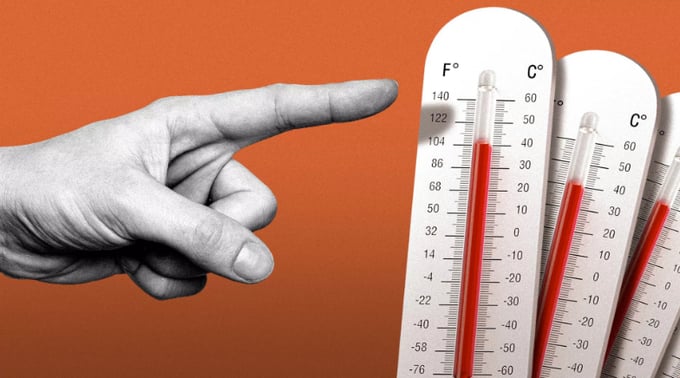May 16, 2025 | 09:58 GMT +7
May 16, 2025 | 09:58 GMT +7
Hotline: 0913.378.918
May 16, 2025 | 09:58 GMT +7
Hotline: 0913.378.918

"Tipping points" refer to junctures in the climate system that, when crossed, can usher in irreversible changes. Tipping points include the near-complete melting of the West Antarctic Ice Sheet or the shutdown of the ocean current that includes the Gulf Stream.
Why it matters: The new study, published Friday in Science, finds tipping points lurking much closer to the present level of warming, and that the Paris Agreement's most stringent warming target of 1.5°C compared to preindustrial levels could trigger four of them.
These would include the abrupt thawing of permanently frozen soil that rings the Arctic and the die-off of warm-water coral reefs.
Context: The study defines a tipping point as when changes in a large part of the climate become self-perpetuating. Not every tipping point immediately affects the planet, and some are only felt regionally.
Still others — like the melting of the West Antarctic Ice Sheet, could take centuries to fully play out.
The big picture: The new study is a more complete but sobering read compared to a similar paper published in 2008, since it adds new tipping points to the list and concludes that at least four of them, including the abrupt thawing of permanently frozen soil that rings the Arctic, are likely to be set off at 1.5°C of warming.
"Current policies leading to [about] 2 to 3°C warming are unsafe," the study states.
Zoom in: The researchers put forward the idea of a tipping point early warning system, which could combine remote sensing, such as satellite measurements, with computer modeling and deep learning techniques.
Perhaps that way, alarms could be sounded before irreversible, harmful changes are set into motion.
What they're saying: "Since I first assessed climate tipping points in 2008 the list has grown and our assessment of the risk they pose has increased dramatically," said study co-author Tim Lenton, of the University of Exeter, in a statement.
"We now need to trigger positive social tipping points that accelerate the transformation to a clean energy future. We may also have to adapt to cope with climate tipping points that we fail to avoid, and support those who could suffer uninsurable losses and damages."
On the agenda at this gathering: "Positive tipping points," which are socio-economic steps that could help accelerate society's transition away from fossil fuels.
A new effort is launching to look at concerns over "cascading risks" that tipping points pose, where there's a chain reaction of sorts.
The new work is called the "Tipping Points Model Intercomparison Project", or “TIPMIP." It too is on the conference program.
The bottom line: In the 20 years since the first tipping points assessment came out, some have become nearly inevitable.
It's clear from this new paper and the broader research on this topic that without dramatic emissions cuts in the interim, we can't allow another 20 years to pass before we take another in-depth look.
(axios)

(VAN) Fourth most important food crop in peril as Latin America and Caribbean suffer from slow-onset climate disaster.

(VAN) Shifting market dynamics and the noise around new legislation has propelled Trouw Nutrition’s research around early life nutrition in poultry. Today, it continues to be a key area of research.

(VAN) India is concerned about its food security and the livelihoods of its farmers if more US food imports are allowed.

(VAN) FAO's Director-General emphasises the need to work together to transform agrifood systems.

(VAN) Europe is facing its worst outbreak of foot-and-mouth since the start of the century.

(VAN) The central authorities, in early April, released a 10-year plan for rural vitalization.

(VAN) Viterra marked a significant milestone in its carbon measurement program in Argentina, called Ígaris, reaching 1 million soybean hectares measured.